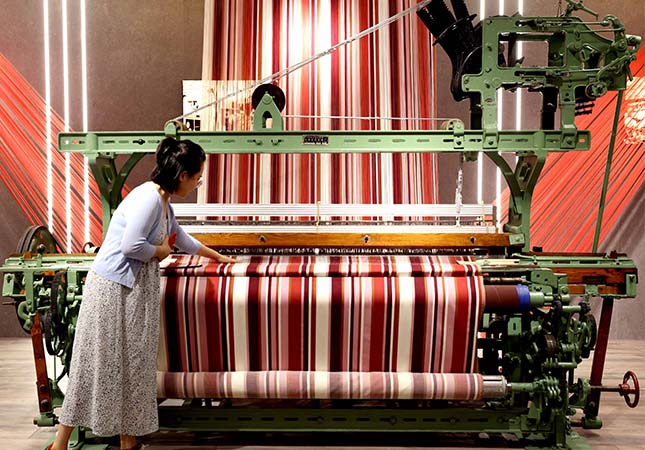India, known for its rich textile heritage, has been experiencing a significant transformation in its textile industry. Central to this progress is the continuous development and adoption of advanced textile machinery. The country's textile machinery sector has been evolving rapidly, driving efficiency, productivity, and innovation across the entire value chain.
Growth and Expansion of the Textile Machinery Market
India's textile machinery market has witnessed impressive growth over the years, propelled by a robust textile and garment industry. The government's initiatives promoting domestic manufacturing, technological advancements, and increasing demand for high-quality textile products have all contributed to the expansion of the market.
The development of textile machinery in India has been led by both domestic manufacturers and international players. Let's explore some of the key players and technological advancements:
l Domestic Manufacturers: Companies such as Lakshmi Machine Works, Voltas, A.T.E. Enterprises, and Rieter India have emerged as prominent domestic manufacturers of textile machinery. These companies have been instrumental in introducing cutting-edge technology, customized solutions, and efficient machinery to cater to the diverse needs of the Indian textile industry.
l International Suppliers: Renowned global suppliers, including Trützschler, Rieter, Toyota, Itema, and Murata Machinery, have a significant presence in the Indian market. They have brought advanced machinery and expertise, contributing to the modernization and upgradation of textile manufacturing processes in the country.

Technological Advancements
The textile machinery sector in India has embraced various technological advancements to enhance efficiency, productivity, and sustainability. Some notable developments include
1. Automation and Digitization: Automation has revolutionized textile manufacturing, enabling precise control over production processes, reducing human errors, and improving productivity. Digitization has enabled the integration of data analytics and real-time monitoring, leading to enhanced efficiency and decision-making.
2. Sustainable Solutions: With a growing focus on sustainability, manufacturers have introduced eco-friendly and energy-efficient machinery. This includes innovations in water and energy management, waste reduction, and recycling systems, ensuring a greener textile production process.
3. Smart Textile Machinery: Internet of Things (IoT) integration has enabled the development of smart textile machinery. Real-time data analysis, predictive maintenance, and remote monitoring capabilities have optimized machine performance, reduced downtime, and enhanced overall efficiency.
Influence on the Textile Industry
The development of textile machinery in India has had a profound impact on the textile industry as a whole. Here are some key benefits:
1. Increased Productivity and Efficiency: Advanced machinery has significantly improved productivity and efficiency in textile manufacturing processes. Automated systems, precise controls, and streamlined operations have led to higher output, reduced turnaround times, and cost savings.
2. Quality Enhancement: The adoption of modern machinery has resulted in improved product quality. Advanced looms, spinning machines, and dyeing equipment have enhanced precision, consistency, and uniformity in textile production, leading to products that meet international standards.
3. Diversification and Innovation: The availability of advanced machinery has enabled Indian textile manufacturers to diversify their product offerings and explore innovative textiles. This has opened up new market opportunities and expanded the industry's potential for growth.
4. Job Creation and Skill Development: The development of textile machinery in India has created employment opportunities, particularly in the areas of machine operation, maintenance, and software programming. This has contributed to skill development and the upskilling of the workforce.
Conclusion
The development of textile machinery in India has been a catalyst for the transformation of the textile industry, empowering it to compete on a global scale. The country's focus on technological advancements, coupled with the presence of domestic and international players, has accelerated the adoption of advanced machinery, resulting in increased productivity, enhanced product quality, and diversification of textile offerings. As India continues to invest in textile machinery development, it is poised to further strengthen its position as a key player in the global textile market, driving innovation and economic growth.




